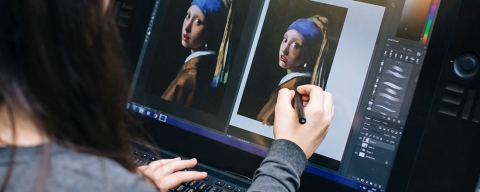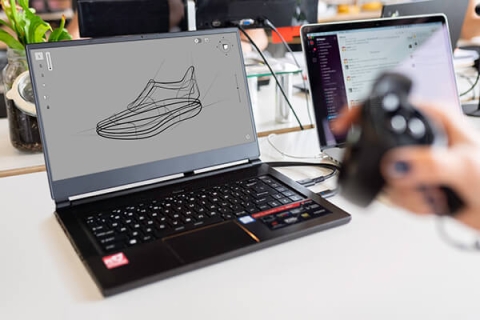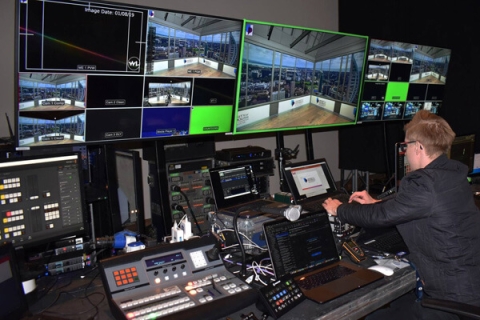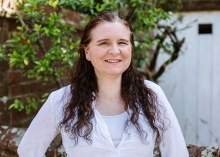
Showing content for section Overview
Overview
This MSc Computer Animation degree will prepare you to work in animation roles across the creative and media industries. Whether you want to work in computer games, television, film or advertising, this Master’s will help you to build on your existing animation experience, specialise in specific areas of animation and prepare for the career you want.
During the course you’ll have opportunities to attend industry talks, network with professionals and develop your showreel. You’ll graduate ready to enter the industry, and be able to showcase your skills, knowledge and experience to potential employers.
Supported by lecturers with experience in many areas of animation, including specialists in 3D modelling/sculpting, texturing, rigging, 3D animation, FX and compositing, this Master's will enhance your technical animation skills and subject knowledge as you use industry equipment and software to build on your previous experience.
You'll apply your learning on your own CGI/Animation/VFX project, which you’ll tailor to your skills, interests and career goals with support from your supervisor.
This qualification is an option on the MSc Creative Technologies course. You'll apply for the MSc Creative Technologies course, then choose Computer Animation as your pathway project after you start the course. You'll graduate with MSc Computer Animation.
Eligibility
This course accepts UK, EU, and International students.
Course highlights
- Specialise in a specific area of computer animation and expand your existing animation skills and knowledge
- Access University facilities including high-end computers and Cintiqs (drawing tablets)
- Use professional level software including Maya, Houdini, Nuke, Substance Painter, and Substance Designer
- Join creative technologies clubs and workshops including ZBrush sculpt club, character animation workshop, film/animation nights
- Attend networking and careers events to meet and build relationships with potential employers
- Attend industry talks
Contact information
Contact AdmissionsEntry requirements
This qualification is an option on our Creative Technologies Master's course. You'll select MSc Creative Technologies when you apply, then choose Computer Animation as your pathway project after you start the course. You'll graduate with MSc Computer Animation.
These are the entry requirements for the MSc Creative Technologies course.
Eligibility
This course accepts UK, EU, and International students.
September 2026 start
A second-class honours degree, or equivalent, in a relevant subject or a master's degree in an appropriate subject.
Please get in touch if you're not sure if your undergraduate subject is relevant to this degree.
Exceptionally, equivalent professional experience and/or qualifications will be considered, such as previous study, employment, voluntary work and training courses, including courses and qualifications you didn't complete. Learn more about our Recognition of Prior Learning (RPL).
If you're applying as an international student with a non-UK degree, you’ll need to show you meet the UK entry requirements listed above.
To find out if your non-UK degree or other qualification is accepted, please visit our page for your country and view the UK equivalent of your qualification.
English language proficiency at a minimum of IELTS band 6.5 with no component score below 5.5.
You do not need an IELTS or equivalent certification if:
- you have a UK degree
- you have a degree from a majority English-speaking country (not taught by Distance Learning)
- you are a national of a majority English-speaking country
Degrees taught solely in English from non-majority English-speaking countries will be considered on a case-by-case basis. Find out more about our English language requirements.
If you do not meet the English language requirements yet, you can achieve the level you need by successfully completing a pre-sessional English programme before you start your course.
An online portfolio submission may be required as part of the selection process.
For more information on how to put together a portfolio, read our MA/MSc Creative Technologies portfolio guide.
Course costs and funding
Tuition fees
UK, Channel Islands, and Isle of Man students
- Full time: £9,700
- Part time: £4,850 per year, subject to annual increase
International and EU students
- Full time: £18,600
- Part time: £9,300 per year, subject to annual increase
If you're an EU student you may be eligible to receive our EU Scholarship.
University of Portsmouth graduates may receive a 20% alumni tuition fee discount.
Fees are subject to annual increase. Read our tuition fees terms and conditions.
You'll be able to pay your fees in instalments. Find out how to pay your tuition fees.
Funding your studies
Explore how to fund your studies, including available scholarships and bursaries.
If you're a UK student, you may be eligible for a Government Postgraduate Master's Loan, which you can use to help with course fees and living costs.
Loans, scholarships and bursaries
Browse funding such as the Government Postgraduate Loan, our scholarships for new and returning students, and subject specific loans.

Funding for international students
Learn more about sponsorships, scholarships and loans for students applying from outside of the UK.

Fees and funding for Master's courses
Explore Master's funding options, including loans, scholarships, bursaries and more.

You'll be applying for MSc Creative Technologies but you'll graduate with a MSc Computer Animation Master's degree when you complete the course.
Our courses fill up quickly, so submit your application as soon as you decide which course you want to study.
Modules
What you'll study (full-time)
Core modules
We’ll help you improve crucial skills for your Master’s success: critical thinking, communication, and project management. You’ll work in seminars and with a personal tutor to assess what you need for academic and professional growth. Create an action plan to improve qualities like presenting, researching, and contextual analysis.
You’ll also define your career goals, interests, and strengths, which will give you valuable insights for your path ahead. By reflecting and combining different views, you’ll write an assignment that clearly states your personal progress.
By the end of this module, you’ll have a toolkit for success in your studies and career. Use this module as a stepping stone to take full advantage of your time on this course and prepare for achieving your future objectives.
Dive into your project topic through critical review. We’ll guide you in gathering an extensive set of research and help you make strong decisions in your area of study. You’ll pinpoint what new things you can add and start making proof-of-concepts that fit your Master’s focus.
You’ll use various sources to set up solid theoretical, historical, and critical foundations for your project. Learn how to choose and use different research methods to answer your questions and meet your creative goals. By organising and presenting your findings clearly, you’ll lay the groundwork for an exciting final project that displays your academic abilities.
Come build the base for your major project with us, and open up opportunities to provide new perspectives in your field.
Use your research and apply what you’ve learned to create a standout piece for your portfolio. We’ll help you develop original solutions, select the best methods, and carefully plan out your work—whether it’s an artefact, exhibition, performance, or published paper. Explore the relationship between your ideas, approach, and the impact of research on professional practice. By evaluating and enhancing your project, you can overcome a major creative or research hurdle and showcase your exceptional skills.
With our support and your hard work, you’ll finish an excellent capstone project that will be the launchpad for your professional life. This module will help fulfil your ambition as a skilled researcher, innovator, and leader in your discipline.
We’ll help you turn your research or creative ideas into a professional reality. You’ll then review and tweak your work, using what you’ve learned to hone it further. Our seminars will guide you to perfect your project with great skill and thought, meeting professional standards. You’ll also learn to welcome feedback, using it to place your work among the latest issues in your field.
This module is your chance to show how well you can come up with ideas, develop them, and judge your own work. You’ll graduate with a project that shows your creativity, analytical skills, and professional approach—proving you’re ready to be a leader in your area of expertise.
What you'll study (part-time)
Core modules
We’ll help you improve crucial skills for your Master’s success: critical thinking, communication, and project management. You’ll work in seminars and with a personal tutor to assess what you need for academic and professional growth. Create an action plan to improve qualities like presenting, researching, and contextual analysis.
You’ll also define your career goals, interests, and strengths, which will give you valuable insights for your path ahead. By reflecting and combining different views, you’ll write an assignment that clearly states your personal progress.
By the end of this module, you’ll have a toolkit for success in your studies and career. Use this module as a stepping stone to take full advantage of your time on this course and prepare for achieving your future objectives.
Dive into your project topic through critical review. We’ll guide you in gathering an extensive set of research and help you make strong decisions in your area of study. You’ll pinpoint what new things you can add and start making proof-of-concepts that fit your Master’s focus.
You’ll use various sources to set up solid theoretical, historical, and critical foundations for your project. Learn how to choose and use different research methods to answer your questions and meet your creative goals. By organising and presenting your findings clearly, you’ll lay the groundwork for an exciting final project that displays your academic abilities.
Come build the base for your major project with us, and open up opportunities to provide new perspectives in your field.
Core modules
Use your research and apply what you’ve learned to create a standout piece for your portfolio. We’ll help you develop original solutions, select the best methods, and carefully plan out your work—whether it’s an artefact, exhibition, performance, or published paper. Explore the relationship between your ideas, approach, and the impact of research on professional practice. By evaluating and enhancing your project, you can overcome a major creative or research hurdle and showcase your exceptional skills.
With our support and your hard work, you’ll finish an excellent capstone project that will be the launchpad for your professional life. This module will help fulfil your ambition as a skilled researcher, innovator, and leader in your discipline.
We’ll help you turn your research or creative ideas into a professional reality. You’ll then review and tweak your work, using what you’ve learned to hone it further. Our seminars will guide you to perfect your project with great skill and thought, meeting professional standards. You’ll also learn to welcome feedback, using it to place your work among the latest issues in your field.
This module is your chance to show how well you can come up with ideas, develop them, and judge your own work. You’ll graduate with a project that shows your creativity, analytical skills, and professional approach—proving you’re ready to be a leader in your area of expertise.
Changes to course content
We use the best and most current research and professional practice alongside feedback from our students to make sure course content is relevant to your future career or further studies.
Therefore, some course content may change over time to reflect changes in the discipline or industry. If a module doesn't run, we'll let you know as soon as possible and help you choose an alternative module.
Facilities and specialist software

3D software and game engines
Deliver slick, professional projects using industry-wide 3D rendering programs like Maya and 3DS Max, and power them with engines such as Unity and Unreal.

CCIXR
Create stunning works for film, TV, music, gaming and immersive reality in the UK's first integrated facility of its kind.

Eldon TV studios and CCI TV
Learn the skills you need to work in video/audio production and broadcasting and get involved in our student-led TV channel, CCI TV.
You'll also use facilities including our:
- Volumetric Capture studio
- photogrammetry studio
- White Swan TV studio
- Wacom studios
- Lightbox suites
- Motion capture studio
- VR lab
- Video editing suite
How you'll spend your time
We recognise that you'll probably be juggling more demands when you do your Master's degree, as you may be working or you may have family responsibilities.
We'll give you as much indication here as we can of how much time you'll need to be on campus and how many hours you can expect to spend in self-directed study, but please note that these indications are always subject to change. You should receive your full timetable several weeks before you start with us.
It is our expectation that all international students will join us here on campus in Portsmouth.
Course structure
This Master's degree runs over 12 months. You can expect:
- to attend campus for 1 day per week
- opportunities to attend additional undergraduate lectures
- to access learning resources online in your own time
Teaching
Teaching on this course includes:
- lectures
- seminars
- workshops
- tutorials
You'll be introduced to key topics and expected to do independent study to develop your skills and projects to a proficient level, supported by scheduled activities.
Our teaching staff includes industry professionals who've worked on commercial productions such as Guardians of the Galaxy, Exodus: Gods and Kings, Jupiter Ascending, Prince Caspian, Hellboy, Lord of the Rings and Harry Potter.
Assessment
You'll be assessed through:
- practical artefacts
- written reports
- creative projects
You'll be able to test your ideas and techniques informally before doing assessments that count towards your final mark.
Feedback is available on all practice and formal assessments so that you can improve in the future. You'll receive detailed written feedback on summative assignments, while formative feedback may be written or verbal.
You'll be paired with a project supervisor who provides ongoing feedback.
Term dates
September start
The Master's academic year runs from September to the following September. There are breaks at Christmas and Easter. Over the summer you'll be writing your project/dissertation.

Joining us as an international student
You'll feel at home in our international community and our diverse city. You'll be joining over 5,000 international students from more than 150 countries who are studying with us.
Learn more about international student life and how we can help you with visas, applications, arrival and settling in.
Careers and opportunities
Careers this Master's prepares you for
This MSc Computer Animation degree is your opportunity to specialise in a particular area of animation and develop your existing industry skills. You'll build on the broad knowledge you gained at undergraduate level.
During the course you’ll enhance your showreel as you prepare for work in industry.
Graduates of this course have gone onto roles such as:
- 3D generalist
- animators
- concept artists
- storyboard artists
- compositors
- creative directors
- art directors
- modellers
- riggers
- texture artists
- fx artists
- motion capture technicians
- freelance artists
Graduates of this course have gone on to work in roles such as:
- facial motion capture at Industrial Light and Magic
Career planning
During your course, you'll have expert career support from your tutors and from our Careers and Employability Centre, which you can access for 5 years after you graduate.

Career support
You'll benefit from:
- Networking events
- 1-to-1 appointments
- CV and cover letter advice
- Interview preparation and practice
- Workshops to enhance your employability skills
- Recruitment events, including the Student and Graduate Opportunities Fair
- Support starting your own business
Supporting you
Master's study is more focused on independent learning than undergraduate study, but you'll get lots of support via video, phone and face-to-face from teaching and support staff to enhance your learning experience and help you succeed. You can build your personalised network of support from the following people and services:
Types of support
Your personal tutor helps you make the transition to postgraduate study and gives you academic and personal support throughout your time at university.
You'll have regular contact with your personal tutor in learning activities or scheduled meetings. You can also make an appointment with them if you need extra support.
In addition to the support you get from your personal tutor, you'll also have access to a Faculty student support advisor. They can give you confidential, impartial advice on anything to do with your studies and personal wellbeing and refer you to specialist support services.
If you need support with software and equipment or you want to learn additional skills (including skills not covered on your course), our creative skills tutors provide free workshops, activities and one-on-one tutorials. Skills you can learn include life drawing, film camera operation and video production.
You'll have help from a team of faculty academic skills tutors. They can help you improve and develop your academic skills and support you in any area of your study.
They can help with:
- Improving your academic writing (for example, essays, reports, dissertations)
- Delivering presentations (including observing and filming presentations)
- Understanding and using assignment feedback
- Managing your time and workload
- Revision and exam techniques
Computing support staff are always available to give technical support in the Faculty's computer suites during normal working hours. There's also some support available from 5.00pm to midnight at busy times of the year.
During term time, Faculty Academic Skills Tutors (AST) are available for bookable 1-to-1 sessions, small group sessions and online sessions. These sessions are tailored to your needs.
Support is available for skills including:
- University study
- Getting into the right study mindset
- Note-taking and note-making skills
- Referencing
- Presentation skills
- Time management, planning, and goal setting
- Critical thinking
- Avoiding plagiarism
If you have a disability or need extra support, our Disability Advice team will give you help, support and advice.
You can get personal, emotional and mental health support from Student Wellbeing, in person and online. This includes 1-2-1 support as well as courses and workshops that help you better manage stress, anxiety or depression.
If you require extra support because of a disability or additional learning need our specialist team can help you.
They'll help you to
- discuss and agree on reasonable adjustments
- liaise with other University services and facilities, such as the library
- access specialist study skills and strategies tutors, and assistive technology tutors, on a 1-to-1 basis or in groups
- liaise with external services
Library staff are available in person or by email, phone or online chat to help you make the most of the University's library resources. You can also request one-to-one appointments and get support from a librarian who specialises in your subject area.
The library is open 24 hours a day, every day, in term time.
If English isn't your first language, you can do one of our English language courses to improve your written and spoken English language skills before starting your degree. Once you're here, you can take part in our free In-Sessional English (ISE) programme to improve your English further.
This qualification is an option on the Creative Technologies Master's course. You'll apply for the MSc Creative Technologies course, then choose Computer Animation as your pathway project after you start the course. You'll graduate with MSc Computer Animation.
These are the entry requirements for the MSc Creative Technologies course.
How to apply
Unlike undergraduate applications, which go through UCAS, applications for this Master's course are made directly to us.
There's no deadline for applications to this course. We accept applications right up until the start date in September, as long as there are places available. If you wait until September to apply, you may find that the course is full.
If you're applying as an international student, remember that you'll need to leave plenty of time to get your visa organised.
You can find more advice about applying in our Master's application checklist. International students and current students and recent graduates of the University of Portsmouth also have some different application options, which are detailed below.
Extra information for international students
If you're an international student, you can apply directly to us using the same application form as UK students.
You could also get an agent to help with your application. Check your country page for details of agents in your region. To find out what to include in your application, head to the how to apply page of our international students section.
If you don’t meet the English language requirements for this course yet, you can achieve the level you need by successfully completing a pre-sessional English programme before you start your course.
You'll apply for MSc Creative Technologies but you'll graduate with a MSc Computer Animation Master's degree when you complete the course.
Ready to apply?
I'm a current Portsmouth student, or a recent Portsmouth graduate
If you're currently in your final year of study at Portsmouth, or you graduated since July 2024, you're eligible to make a fast track application. You'll have:
- a shorter application form to complete
- access to the 20% Alumni fee discount
- a guaranteed conditional offer, for most Master's courses
After you apply
Once we receive your application, we may ask you for further information. We will then either make you an offer or suggest alternatives if your application is unsuccessful.
You'll usually get a decision within 10 working days, so you shouldn't have to wait too long. Some courses have an interview stage – we'll let you know if you need to prepare for one.
Learn more about how we assess your application.
Admissions terms and conditions
When you accept an offer to study at the University of Portsmouth, you also agree to abide by our Student Contract (which includes the University's relevant policies, rules and regulations). You should read and consider these before you apply.


